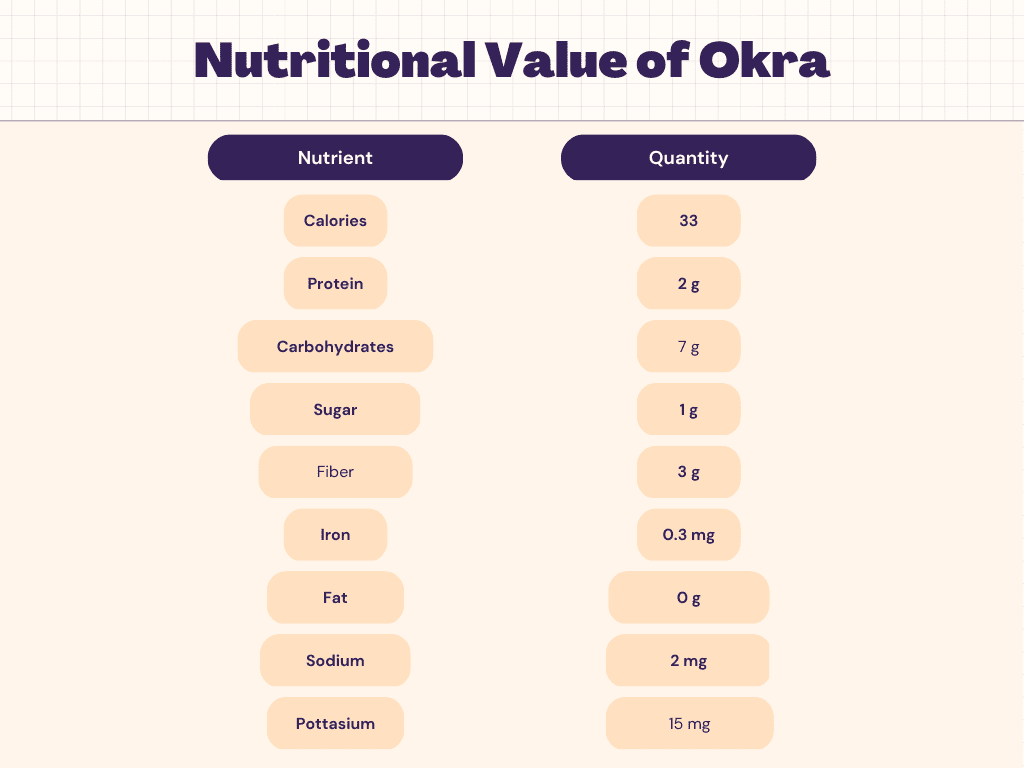A flowering plant called okra is well-known for its tasty seed pods. It is grown in regions with warm, tropical temperatures like Africa and South Asia. Okra comes in two colors, red and green, and is occasionally referred to as “lady’s finger.” The red variety turns green when cooked, and both varieties have the same flavor. In order to make okra water, okra pods must be soaked in water for up to 24 hours. Its supporters assert that among other health advantages, it accelerates weight loss and enhances blood sugar control. It’s also regarded as a practical substitute for eating okra, particularly for individuals who dislike its distinctive flavor and texture.
Nutritional Value of Okra
Nutritional Facts of Okra
Carbs
Under 4 grams of carbohydrates are present in a half-cup of cooked okra. Similar is raw okra. Fiber makes up around half of the carbohydrates, and naturally occurring sugar makes up the other half. A food’s glycemic index serves as a gauge for how quickly and by how much it will boost your blood sugar. Okra is believed to have a low glycemic index, similar to the majority of non-starchy vegetables.
Fat
Okra contains extremely little fat, and the majority of it is the healthier unsaturated fat and fatty acids.
Protein
Okra isn’t particularly high in protein, like most vegetables.
Health Benefits Of Okra
- Helps battle cancer – Antioxidants are organic substances that support your body’s defense mechanisms against chemicals known as free radicals that can harm cells. The most well-known effect of free radicals is oxidative damage, which over time might result in cancer.
- Supports heart and brain health – Through the reduction of free radical damage and the prevention of blood clots, polyphenols lower your risk of heart disease and stroke. Okra’s antioxidants might also help your brain by lowering inflammation there.
- Helps with Diabetes – Numerous studies have suggested that okra may aid with blood sugar regulation. Okra, according to researchers, may aid in preventing the absorption of sugar during digestion. Follow our Diabetes Plans
- Helps with Weight loss – Okra water is a strong source of a number of antioxidants and may help with blood sugar control and weight loss. However, further human study is still required. Check our weight loss plans.
Vitamins & Minerals in Okra
In addition to being a good source of vitamin C, manganese, magnesium, and vitamin B6, okra also contains high levels of vitamin K.
The Bottom Line
Although okra is most well-known for being a key component in gumbo, it can also be roasted, grilled, or sautéed and eaten by itself or in combination with other vegetables, such as tomatoes. It is less slimy when cooked whole (just clip the ends). Okra also tastes great in stir-fries, curries, and soups where it thickens the liquid. It can be used in place of eggplant, zucchini, or green beans. Okra is a fantastic source of manganese and vitamin C, but further research is needed to assess the nutritional worth of okra water. Okra water is a strong source of a number of antioxidants and may help with blood sugar control and weight loss.
FAQs
What is the best time to eat Okra?
If you want your insides cleaned then the night is the finest time. If you want to have pain-free movements then morning is optimal (better bowel movement).
How much Okra is too much Okra?
Some people may have negative effects from eating too much okra. Obstacles to digestion: Okra includes fructans, a form of carbohydrate. People who already have digestive issues may have diarrhea, gas, cramping, and bloating from fructans. Kidney stones: Okra contains a lot of oxalates.
What are the benefits of Okra?
- Supports Bone and Blood Health
- Provides Filling Fiber
- May Lower Blood Sugar
- Helps in Weight loss










